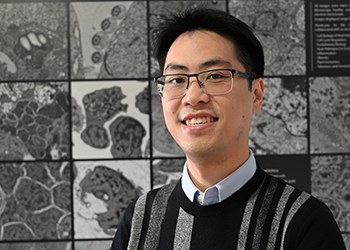
Microbial Genomics and Symbiosis
Waldan Kwong
The group is broadly interested in the ecology, evolution, and function of microorganisms: How have they become so diverse and successful? What enables them to form complex communities with each other, and with multicellular eukaryotes? How can we benefit from their tremendous evolutionary innovations?
Currently, the Microbial Genomics and Symbiosis Lab is using social bees as a model system to investigate these questions. Social bees, including honey bees and bumble bees, possess a simple, yet unique, gut microbiota that has only recently been described, and is still poorly understood. We are working to understand the function and natural history of these microbes, through developing genetic tools, genomic datasets, and culture collections. As prolific pollinators of plants, bees are critical for sustaining both natural ecosystems and human agriculture. Understanding their relationship with their symbiotic gut microbes will help uncover ways to improve the health and aid conservation of these important insects.
The lab is also exploring other understudied microbiomes, such as the protist communities associated with corals and other marine systems, which we study using amplicon sequencing, metagenomics, and single-cell transcriptomics. By broadening our view of microbial symbioses, these systems will help us understand the diverse ways in which microorganisms have evolved to interact and thrive in their environments.
Funding


Projects
Microbial communities (microbiomes) play important roles in the health of their animal hosts. Despite the importance of maintaining a healthy microbiome, little is known of how natural microbial communities form and persist. This EMBO-funded project aims to understand the genetic factors underlying microbiome organization, using a social insect model (bees) that mimics many aspects of more complex, intractable systems such as that of the human microbiome.
This work will explore two main areas:
Using innovative approaches and multidisciplinary methods, including high-throughput genomics, microscopy, and in vivo experiments, this project will integrate findings across scales, from the molecular level to the ecological and evolutionary levels. Ultimately, this work will help us understand how stable microbial communities form and persist, and help uncover ways to improve microbiome resilience in the face of pathogenic invaders and environmental perturbations. Thus, this research will have broad implications across all fields where microbiomes play important roles including in agriculture, medicine, and biotechnology.
Starting date: January 2022 | Funding obtained: 50.000 €
Publications
- Waldan K. Kwong et all (2024) Complete genome sequences of 12 bacterial strains from the honey bee gut, resolved with long-read nanopore sequencing. Microbiology Resource Announcements Volume 0
